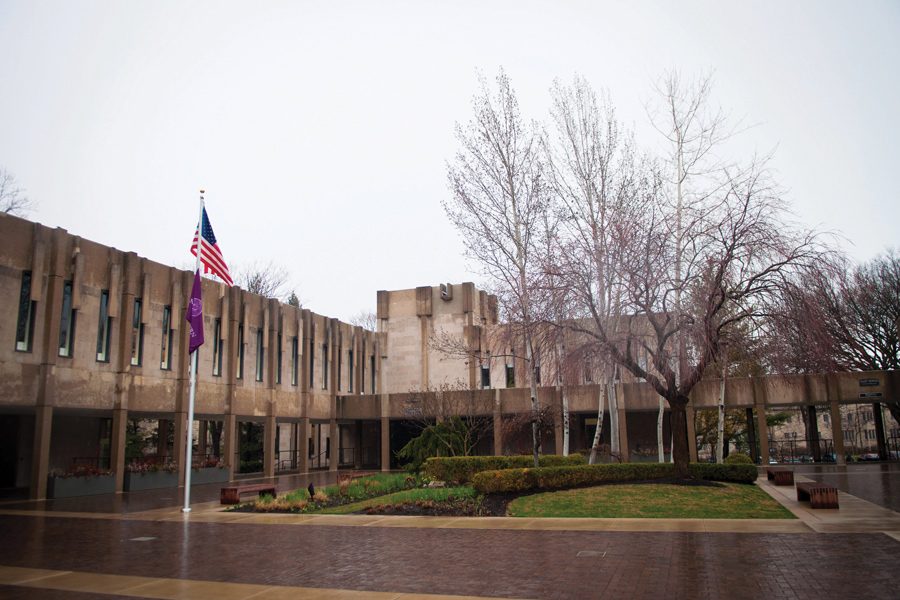The Graduate School moves to limit sixth-year student funding
Daily file photo by Daniel Tian
Rebecca Crown Center, home of The Graduate School. The school announced it will no longer grant interdisciplinary assistantships to sixth-year graduate students.
May 22, 2018
The Graduate School is barring some students from using interdisciplinary assistantships to fund their sixth year of study, prompting condemnation from students as some struggle to offset the newly imposed financial burden.
Graduate School Dean Teresa Woodruff clarified the policy in an email to humanities and social science students earlier this month after word had circulated that she was prohibiting several departments from granting interdisciplinary assistantships to sixth-year students.
Assistantships — which include research and teaching positions — supplement the various financial supports many graduate students obtain, including stipends, external scholarships and private loans. Graduate School policy allows doctoral students to secure the special interdisciplinary funding only during their second through fifth years. However, exceptions had been made in the past to allow students to continue receiving assistantships beyond their fifth year.
But Woodruff said in her email to students that the school would no longer make exceptions to the school’s policy. Graduate students took issue with the announcement, saying the sudden change harms those who had believed the funding would be available.
“The Dean’s sudden decision to enforce a no-exceptions policy has pulled the rug from under the feet of our peers,” NU Graduate Workers wrote in a May 10 statement. “Graduate workers projected to have funding for the next couple of academic years must now scramble to secure their very livelihood for this fall.”
TGS spokesman Rich Cohrs told The Daily in a Wednesday email that graduate student support has increased this academic year. He said newly-awarded funding like the interdisciplinary assistantship is “being more consistently limited to the first 5 years.”
Cohrs added that “funding packages” and offer letters will remain unchanged.
Angela Leone — a sixth-year graduate student in the communication studies department — said she applied for an assistantship position with the Searle Center for Advanced Teaching and Learning that would have ensured her funding for two years, only to have her offer rescinded.
Applying for the Searle Graduate Associate position, she said, took years of involvement with the center. She said reaching the candidacy stage of recommended eligibility took years of development within her program, and despite following department and University best practices, she suddenly found herself without funding, continued insurance or tuition coverage.
Leone, who completed a Master’s degree as part of her Ph.D. program, said the policy disproportionately restricts her because she has pursued two degrees at Northwestern.
The news comes months after the University publicly announced a deficit ranging between $50 million and $100 million for the 2018 fiscal year. Provost Jonathan Holloway told Faculty Senate in January that academic functions would not be substantially impacted.
“This annoyance is not going to have a major impact on our academic priorities,” he said. “We’re still recruiting faculty, we’re still pursuing opportunities. … My hope is that for the great majority of the campus, including the faculty, you will not notice any difference.”
But The Graduate School’s move raises questions about whether administrators are feeling a financial squeeze. According to meeting minutes obtained by The Daily, Woodruff told Graduate School faculty earlier this month that “finances are more complex than they have been in the past,” despite financial support for doctoral students having grown 7 percent over each of the past nine years.
After TGS announced Tuesday that administrators would hold office hours to discuss the policy, NU Graduate Workers said in a statement that it will connect affected students to one another and continue to build support for them.
“Financial precarity should not threaten advanced-year graduate workers’ academic success at Northwestern University,” the statement said.
Gabby Birenbaum contributed reporting.
This story was updated at 12:15 p.m. with a comment from TGS spokesman Rich Cohrs and at 2:30 p.m. to clarify that Angela Leone is a sixth-year graduate student, that she spent years preparing to apply for an assistantship position with the Searle Center for Advanced Teaching and Learning and that she completed a Master’s degree as part of her Ph.D. program at Northwestern. The story was also updated to include Leone’s comments about The Graduate School’s policy and how she has been affected by losing the assistantship offer.
Correction: A previous version of this story misstated when Leone’s acceptance was rescinded. Her assistantship offer was rescinded before Woodruff sent out an email clarifying the school’s funding policy. The Daily regrets the error.
Email: [email protected]
Twitter: @juliaesparza10
Email: [email protected]
Twitter:@_perezalan_












